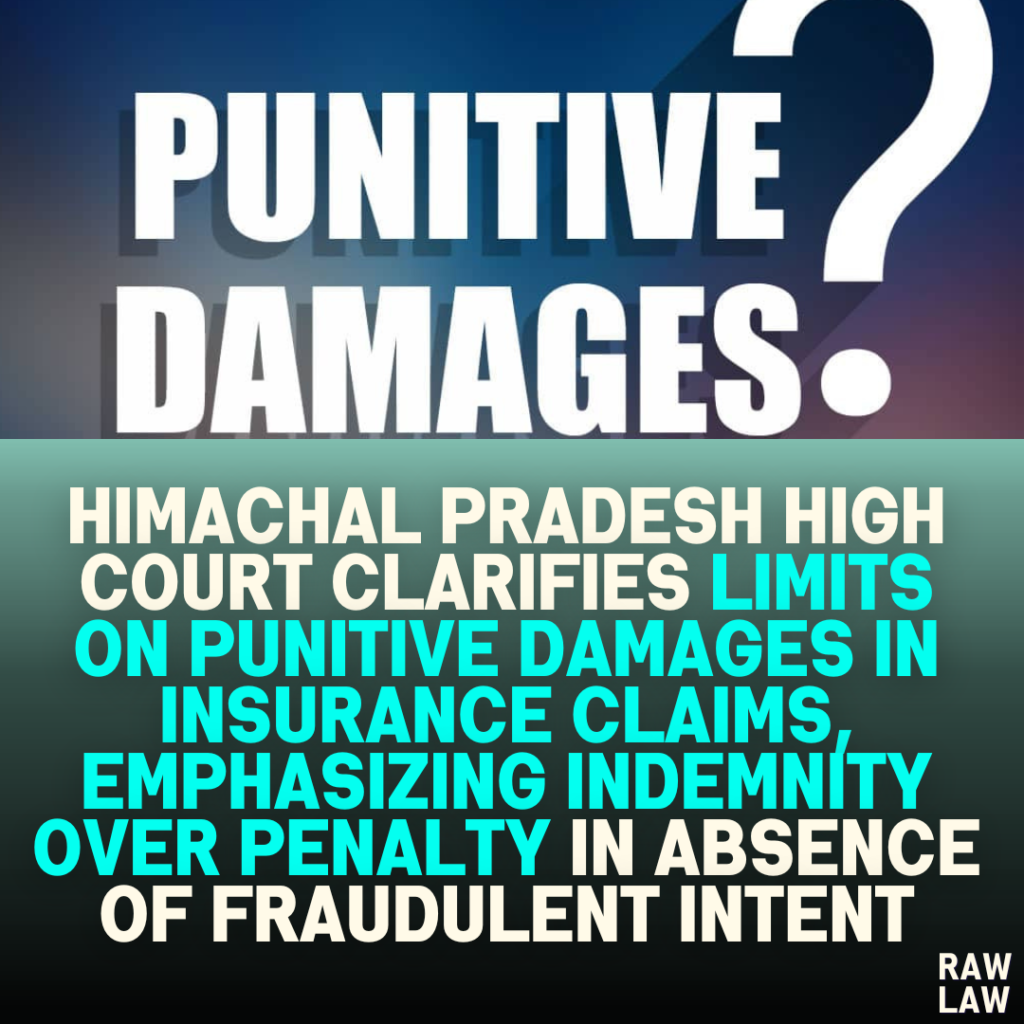Court’s Decision:
The Himachal Pradesh High Court ruled that punitive damages are generally inappropriate in cases of breach of contractual duties in insurance claims. The court held that insurance disputes should focus on compensating the insured party rather than punishing the insurer. Thus, punitive damages should not be awarded unless a breach involves malfeasance with an intent to deceive.
Facts:
The case involves an insurance dispute where the insured party sought additional damages, arguing that the insurer’s failure to timely process the claim amounted to a breach of duty justifying punitive damages. The insurer disputed the claim, asserting that the delay was due to procedural requirements, not malfeasance.
Issues:
- Whether punitive damages can be awarded in cases involving breach of contractual duty by an insurer.
- What level of misconduct or breach justifies punitive damages beyond compensatory relief in insurance disputes.
Petitioner’s Arguments:
The petitioner argued that the insurer’s delayed response in processing the insurance claim constituted a breach of duty, causing significant financial and emotional distress. They claimed that the insurer’s behavior warranted punitive damages to deter future misconduct.
Respondent’s Arguments:
The respondent (insurer) contended that the delay was unintentional and due to standard procedural reviews required in the insurance claim process. They argued that their actions did not meet the threshold for punitive damages, as there was no intent to deceive or harm.
Analysis of the Law:
The court analyzed the legal standards for awarding punitive damages in contractual disputes, particularly within the context of insurance claims. It emphasized that punitive damages are generally limited to tort cases involving fraud, malice, or deliberate wrongdoing. In cases of contractual breaches, compensatory damages aim to restore the party to its original position without punishing the breaching party.
Precedent Analysis:
The court referenced precedent establishing that punitive damages are typically reserved for tort cases involving intentional wrongdoing. It cited cases where courts have distinguished between tortious actions warranting punitive measures and breaches of contract, which typically do not justify punitive relief unless accompanied by malicious intent.
Court’s Reasoning:
The court reasoned that in cases of contractual breach without fraudulent or malicious intent, punitive damages are inappropriate. The primary purpose of insurance law is to indemnify the insured, not to penalize the insurer. The court observed that awarding punitive damages without sufficient grounds would disrupt the balance in insurance law and deter insurers from rigorous claim verification practices.
Conclusion:
The court concluded that the petitioner was not entitled to punitive damages in this case, as the insurer’s actions did not rise to the level of malfeasance or deliberate harm. The court upheld the principle that punitive damages in contractual disputes should be applied sparingly and only when necessary to deter clearly wrongful conduct.
Implications:
This judgment clarifies the boundaries for awarding punitive damages in insurance claims, reinforcing that such damages are unsuitable for simple breaches of contract. The ruling emphasizes the compensatory nature of damages in contractual disputes, underscoring the necessity of intentional wrongdoing as a prerequisite for punitive relief. This decision is likely to influence future cases by setting a high bar for punitive damages in insurance contexts, ensuring that insurers are not unduly penalized for standard procedural delays.



